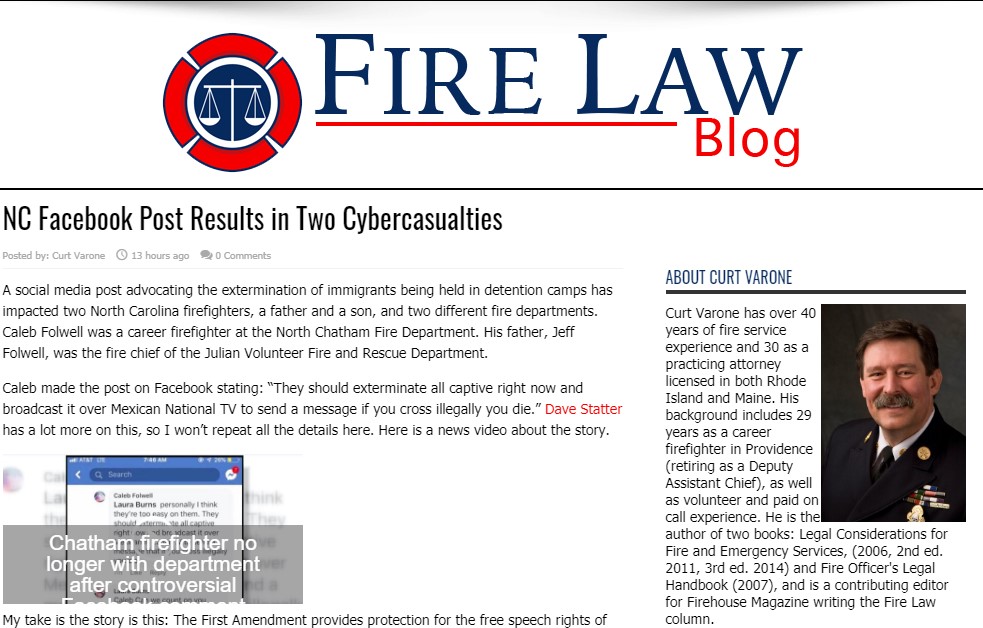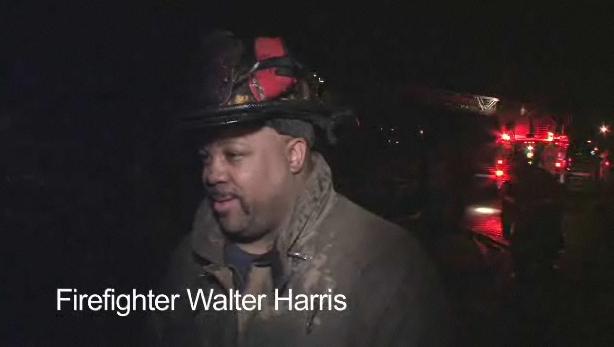Read this column — It could save your job
SMACSS prevention from Curt Varone
Looking for a quality used fire truck? Selling one? Visit our sponsor Command Fire Apparatus
In an age when you can lose your career at the speed of light, what I’m sharing may help you avoid being fired or career damaging discipline. For some, this information will be a refresher. For others, who may mistakenly believe the First Amendment trumps all and will protect public employees no matter what, this could be an eye opener.
What I’m sharing is an excellent column from firefighter and lawyer Curt Varone at Fire Law Blog. In his post, Curt makes clear for the many doubters we both encounter that if you think 1A will automatically protect you when you share your personal views on social media, you may be putting your future in jeopardy. In addition, Curt shows that despite some popular opinion, this is not a new concept. The relevant Supreme Court ruling is from a half-century ago.
Curt wrote the column because of the latest SMACSS (Social Media Assisted Career Suicide Syndrome) incident. The victims were a father and son from North Carolina. Caleb Folwell lost his job as a career firefighter because of his Facebook comment calling for the extermination of immigrants. Folwell also was forced out of the department where he volunteered and where his father Jeff, was chief. According to a strong statement from the Julian Volunteer Fire and Rescue Deparment, the board of directors also parted ways with Jeff Folwell because of unspecified actions surrounding this issue. (NOTE: While the original statement from the department did not name the Folwells, a follow-up interview with local news media confirmed the Folwells were the two people involved):
The remarks posted, and subsequent actions by a second member, do not represent the community-oriented values of this department. By action of the Board of Directors both individuals involved are no longer affiliated with JVFRD. Julian Volunteer Fire and Rescue Department respects all the residents and visitors of the fire district regardless of sex, race, color, national origin, religion, political views or sexual orientation.
Like me, Curt Varone shares these stories in an effort to keep other firefighters out of trouble. The beauty of Varone’s writing is he really knows what he’s talking about (me, on the other hand?) and has dealt closely with these issues in his work as an attorney. His Independence Day column focused on the 1968 U.S. Supreme Court Case Pickering v Board of Education. According to Curt, the justices determined there are three elements “that must be evaluated to determine if the speech is protected” by the First Amendment:
- The speech must involve a matter of public concern
- It must be made as a private citizen
- The employee’s interests must outweigh the employer’s interests
This paragraph from Curt focuses on the element that’s so often the key in social media situations like the North Carolina incident:
A number of federal cases have added an important perspective to the third element, the balancing of interests. Cases hold that even if public employee speech involves a matter of public concern and even if said as a private citizen – if the speech causes actual harm or disruption to the mission & function of the employer, there is no First Amendment protection. In this regard, speech of a racist or discriminatory nature has been found to be unprotected when it causes actual harm or disruption.
Translation: If your comments cause image (or other) problems impacting how your department interacts with the community or disrupts other key parts of the operation, your bosses may be within their rights to discipline or fire you.
When these SMACSS attacks occur, you will often see public safety agencies doing damage control to lessen the negative impact. That’s clearly underway in the statement (above) from Julian Volunteer Fire and Rescue Department. In other words, when your social media comments become a liability and come between your fire department and the public it serves, severing you from the department may be a key component of that damage control. In fighting your dismissal, you may have to prove your interests outweigh those of the fire department. Is that a battle you want? Is that a battle you really think you can win?
Social media can be a wonderful tool, but we live in controversial and stressful times. The mixture of the two can be combustible. The resulting conflagration can harm things and people near and dear to you. Make sure you read Curt Varone’s column and check his site regularly for a better understanding of these issues. Also, save this link and make sure you pass it on to firefighters who tell you they’re certain the First Amendment will come riding in and scoop them off to safety if they don’t use good judgment in a social media post.




